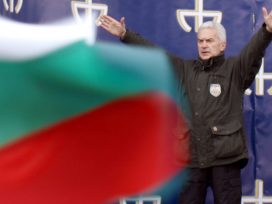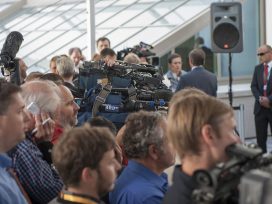17 articles

Fake news has become big news. Post-truth is the new paradigm. Respect for facticity is becoming, by all accounts, a commercial anachronism. And behind it all, the spectre of an illiberal international waging ‘info-war’ against western democracies.
Fake news and disinformation are real and they are dangerous. Their emergence lays bare the vulnerabilities of liberal democracy in globalized, digitally networked societies. And yet we need to be careful about the conclusions we draw. Blaming a combination of digital technologies and the forces of illiberalism only goes so far. We also need to look at the demand side: how are the political and cultural forces that catalyse the spread of disinformation inherent to our own democratic systems?
The concept of post-truth also raises problems. It implies a time when politics was guided solely by rational argument, and when the media dutifully obeyed the imperative of facticity. Not only is this illusory in historical terms, it also expresses a concept of truth as that which possesses authority. Postmodernism was a critique of this kind of positivism, whose connex with power it traced in scientific discourses. The controversy postmodernism triggered within the academe has today been revived in the context of political PR and ‘post-modern dictatorships’. Despite the occasional claims of ‘political technologists’, holding French Theory accountable represents a distortion of its own.
The Eurozine Focal Point ‘Disinformation and Democracy’ opens up new angles on this much-debated topic. It combines empirical focuses at national levels with theoretical discussions of the politics of post-truth; analyses of contemporary discourses and developments with intellectual and conceptual histories; investigations of the political fringes with reflections on democratic normality.
Of course, it is impossible to ignore Russia’s role in the phenomenon we are calling ‘disinformation’. Markus Wehner gives an overview of the strategy, techniques and real dangers of Russian ‘infowar’, above all in connection with attempts in 2016 and 2017 to influence the outcome of national elections. Further articles look into the collusion between Russia and the far-Right: Anton Shekhovtsov traces how pro-Kremlin forces seek to influence political processes in western democracies and how far-right groups across Europe and the US use Russian web hosting services to spread anti-western propaganda; and Daniel Leisegang assesses the effectiveness of Germany’s new law banning online hate speech and fake news faced with the ‘virtual migration’ of the far-Right to Russian host servers. Shifting to eastern Europe, Milena Iakimova and Dimitar Vatsov explore how Russian propaganda co-opts western grassroots criticism of liberalism and globalization, recasting both left and right populism in nationalist terms.
Focusung on national contexts, Nilgün Tutal discusses the impotence of ‘truth’ in contemporary Turkey, where politicians ‘don’t even bother to remember which lies they told’, where ‘the media fails in its duty to remember’, and where ‘the public has no concern for what they heard one day and forgot the next’. Almantas Samalavicius reports on how culture has become a major instrument of Russian propaganda in the Baltic countries, where Russian media are widely consumed, and where politics, business and the cultural sector combine to promote Russian interests. And Orjela Stafasani explains why fake news is rampant in Kosovo’s struggling democracy: without a normalization of the political, institutional and social situation, she argues, a responsible media can never exist in the recently independent Balkan state.
Turning to political theory, Jean-Claude Monod positions a democratic politics between ‘epistemocracy’ and ‘post-truth’: From dialectical materialism to neoliberalism, he argues, any politics that lays claims to the truth is both illusory and dangerous. But does this mean that democracy is simply rule by opinion, without recourse to facts? Joseph Uscinski, meanhile, explores the relationship between conspiracy theorizing and partisanship in the US. Conspiracy theories are all about power and who has it, he writes. The losing side will inevitably accuse the winners of conspiring; Democrats would be convinced that Trump is involved in a grand conspiracy, no matter what evidence was available.
Providing historical perspective, Marci Shore compares western intellectuals’ response to the disappointment of real-existing communism with that of eastern European dissidents. Postmodernism was conceived largely by the Left as a safeguard against totalizing ideologies, she argues. Yet today, it has been appropriated on behalf of an encroaching neo-totalitarianism of the Right. Can a philosophy of dissent developed in communist eastern Europe offer an antidote? Valentin Groebner, meanwhile, recalls debates on written communications in pre-modernity and the emergence of mass media in the late eighteenth century to argue that the history of news is the history of the confusion between the real and the fake.
This focal point is the result of an editorial collaboration within the Eurozine network. The majority of the articles have been commissioned – and in some cases written – by editors of Eurozine partner journals and originally published in languages other than English. All texts are published in English in Eurozine.
Simon Garnett, Editor



Anton Shekhovtsov traces how pro-Kremlin forces seek to influence political processes in western democracies using local activists and politicians, and how far-right groups across Europe and the US increasingly use Russian web hosting services to spread anti-western propaganda.

Culture has become a major instrument of Russian propaganda. Nowhere is this more so than in the Baltic countries, where Russian media are widely consumed, and where politics, business and the cultural sector combine to promote Russian interests. A Lithuanian perspective.

Russian propaganda co-opts western grassroots criticism of liberalism and globalization, recasting both left and right populism in nationalist terms. Vice versa, local actors borrow the Russian propaganda package and use it for their populist purposes. An analysis of Bulgarian media discourse 2013–2016.

Since 1 October 2017, it is illegal in Germany to spread hate speech online. But serious doubts exist, both about the law’s correct enforcement by internet companies, and whether it will be effective against a far-right that now uses Russian servers and social media channels.

In Kosovo, political corruption, a weak cultural sector and the absence of regulatory bodies allow fake news to thrive. Without a normalization of the political, institutional and social situation, a responsible media can never exist in the recently independent Balkan state, writes Orjela Stafasani.

Conspiracy theories are all about power – who has it and what they are doing with it, particularly when no one is looking. The losing side will inevitably accuse the winners of conspiring. Democrats would be convinced that Trump is involved in a grand conspiracy, no matter what evidence was available.

From dialectical materialism to neoliberalism, any politics that lays claims to the truth is both illusory and dangerous. But does this mean that democracy is simply rule by opinion, without recourse to facts? And does the rejection of absolute relativism mean abandoning the postmodernist critique of truth and power?
‘In post-truth regimes, what has been lost is the moral or ethical principle that keeps expression faithful to the truth of what people see, think or feel.’ Nilgün Tutal discusses a famous work of performance art in communist Yugoslavia to show how harmless the concept of truth has become in the face of contemporary authoritarianisms.
The history of news is the history of the confusion between the real and the fake – with that master of disguise, the devil himself, never far away. Today, too, demonic involvement is readily invoked, perhaps to avoid the awkward question: what is the price of reliable information?
Postmodernism was conceived largely by the Left as a safeguard against totalizing ideologies. Yet today, it has been appropriated on behalf of an encroaching neo-totalitarianism of the Right. Is French literary theory to blame? And can a philosophy of dissent developed in communist eastern Europe offer an antidote?
Europe long overlooked the extent of Russian attempts to influence politics in the West through disinformation and cyber warfare. Now the opposite may be the case. Markus Wehner assesses the risks, and looks at measures being taken by the German government.



